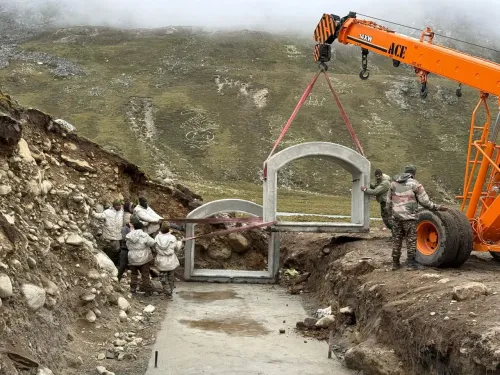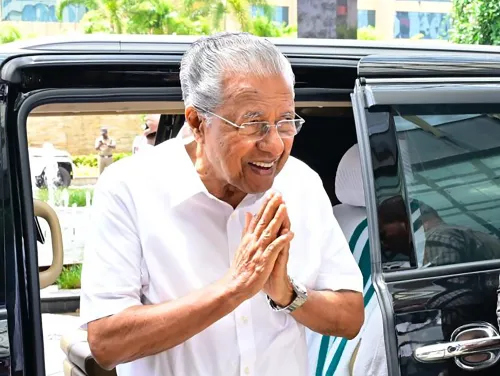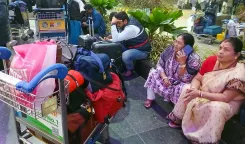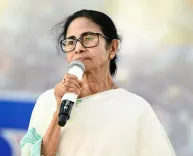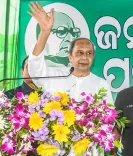Is the Seat-sharing Deadlock Deepening? Grand Alliance Faces Internal Rift Ahead of Bihar Polls
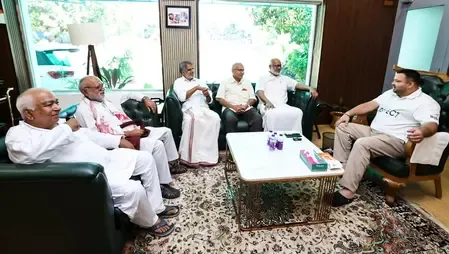
Synopsis
Key Takeaways
- Grand Alliance struggles with seat-sharing negotiations.
- Congress insists on contesting 70 seats despite past performance.
- Internal rifts could jeopardize electoral prospects.
- Discussions among alliance leaders have yet to yield results.
- NDA presents a united front, contrasting the Grand Alliance's discord.
Patna, Oct 17 (NationPress) As the deadline for filing nominations for the first phase of the Bihar Assembly elections approaches, the Grand Alliance (Mahagathbandhan) is facing significant challenges with its seat-sharing negotiations, casting doubt on its cohesion and collaboration. The alliance seems to be on the brink of disintegration.
Despite ongoing assertions of unity, the coalition, which includes the RJD, Congress, CPI-ML, CPI, CPI(M), and VIP, is struggling to align its objectives, with each party focusing on its own benefits.
While numerous parties have declared candidates and allocated symbols for nominations, clarity regarding seat distribution remains elusive, leaving party workers and supporters in a state of uncertainty.
Sources indicate that the Congress’s demand to contest 70 seats has become a significant hurdle.
In the previous 2020 Assembly elections, Congress contended for the same number of seats but only secured 19, achieving a strike rate of 27 percent, a performance largely blamed for the alliance's failure to secure the 122-seat majority required to form a government.
This time, RJD chief Lalu Prasad Yadav is reportedly hesitant to make the same error. He insists that Congress should aim for fewer seats, while the Grand Old Party remains steadfast in its demand for 70.
Leading figures from the Grand Alliance, including Tejashwi Yadav, Dipankar Bhattacharya, and Mukesh Sahani, have held multiple discussions with Congress leaders in Delhi to finalize the seat-sharing arrangement. However, after several days of talks, no agreement has been reached.
Tejashwi Yadav and Mukesh Sahani reportedly awaited a resolution until the last minute on Thursday (October 16), but the formula remained unsettled.
The Vikassheel Insaan Party (VIP), helmed by Mukesh Sahani, has emerged as another significant obstacle.
Initially requesting 60 seats and a Deputy Chief Minister position, Sahani eventually reduced his demands to 18 seats.
On Thursday, sources revealed that the RJD had consented to allocate 15 seats to the VIP, accompanied by the assurance of two MLC positions and one Rajya Sabha seat.
The absence of consensus and cooperation has severely undermined the Grand Alliance's narrative of unity.
Although the coalition displayed solidarity during the Voter Adhikar Yatra led by Rahul Gandhi and Tejashwi Yadav, that spirit seems to be absent during this critical seat-sharing phase.
So far, the alliance has refrained from conducting any joint press conference to present a united front ahead of the high-stakes election.
Compounding the confusion, a press conference by VIP chief Mukesh Sahani, originally scheduled for Thursday at 12 noon, then postponed to 4 p.m., was ultimately cancelled, igniting speculation within political circles.
In several districts, VIP supporters have called for immediate clarity from party leadership regarding seat distribution.
Political analysts warn that the seat-sharing impasse could inflict significant electoral harm on the Grand Alliance, which was anticipated to emerge as a cohesive alternative to the ruling NDA in Bihar.
Experts suggest that the constituent parties of the Grand Alliance—RJD, Congress, CPI-ML, CPI, CPI(M), and VIP—are exhibiting overly ambitious seat expectations, disregarding their actual presence on the ground.
“Everyone knows that the Congress has significantly lost ground in Bihar. It largely relies on the RJD’s Muslim and Yadav vote base. The Congress seeks to benefit from that foundation, but delaying the seat-sharing agreement until the final day of nominations has sent the wrong message to voters,” emphasized Patna-based political analyst Sarvoday Nath.
“They have squandered five to six crucial days since the Election Commission’s notification. This delay showcases poor coordination within the alliance,” he added.
Nath further noted that the rift between the RJD and Congress was evident during the Voter Adhikar Yatra, when Tejashwi Yadav publicly declared Rahul Gandhi as the INDIA bloc’s Prime Ministerial candidate, yet no Congress leaders, including Rahul Gandhi, supported Tejashwi as the Chief Ministerial candidate for Bihar.
“Currently, RJD, CPI-ML, CPI, CPI(M), and VIP are united in positioning Tejashwi Yadav as the Grand Alliance’s CM face. However, the Congress appears isolated. It wouldn’t be surprising if Congress leaders choose not to participate in joint campaigns this election,” Nath remarked.
As the Grand Alliance grapples with internal discord, the NDA, led by Prime Minister Narendra Modi and Chief Minister Nitish Kumar, is showcasing an image of solidarity.
Despite minor disagreements involving Jitan Ram Manjhi and Upendra Kushwaha, the NDA promptly concluded its seat-sharing agreement and initiated a coordinated campaign throughout the state.
Political analysts believe this stark contrast could favor the NDA during the critical campaign period.
Meanwhile, the Congress has released its initial list of 48 candidates and is anticipated to unveil the second list shortly.
The Election Commission issued notifications for the first and second phases of the Bihar Assembly elections on October 10.
The deadline for submitting nominations for the first phase is October 17, and for the second phase, it is October 20.
The elections are scheduled for November 6 and 11, with results to be announced on November 14.
As the nomination window for the first phase nears closure, the Grand Alliance’s indecision has cast serious doubts on its coordination, credibility, and campaign preparedness.



